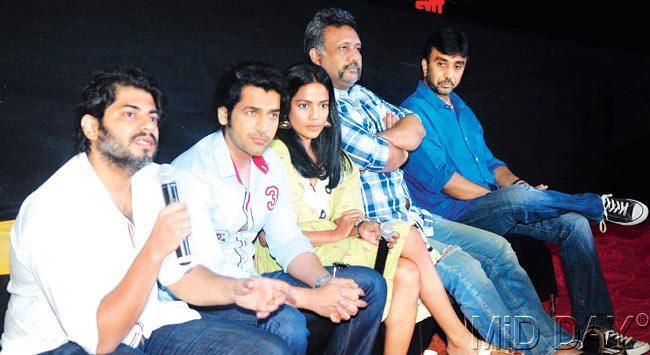At a session held during the Jagran Film Festival, industry insiders threw light on how casting can change a film’s fate

Atul Mongia, Arjan Bajwa, Priyanka Bose, Anubhav Sinha and Sanjay Gadhvi
Over the past few days, the Mumbai leg of the fifth edition of Jagran Film Festival (JFF) has witnessed some really interesting, not to mention highly interactive, panel discussions.

(from left to right) Casting director Atul Mongia, actors Arjan Bajwa and Priyanka Bose, and filmmakers Anubhav Sinha and Sanjay Gadhvi at the fifth Jagran Film Festival at PVR Citi Mall. Pic/Nimesh Dave
One such session held on Wednesay saw director Sanjay Gadhvi, producer Anubhav Sinha, actor Arjan Bajwa, actress Priyanka Bose and casting director Atul Mongia share the dais. Moderated by Manoj Srivastav, strategic consultant, JFF, the topic being dissected was the significance of good casting and the challenges that actors usually face. hitlist brings you an excerpt from the event...
Manoj Srivastav: From a filmmaker’s point of view, what exactly constitutes casting?
Sanjay Gadhvi: Getting the cast right is the first step towards getting a film right. In a director’s mind, the character has a certain look, a certain getup that has to justify his or her personality. The filmmaker is naturally going to cast someone who closely resembles the person he has in his head. The second factor is, obviously, talent. Because what happens is that actors usually lend an unprecedented quality to the character. In such a scenario, the filmmaker has to fit the actor into the preconceived character. This happens only in cases of explosive talents in place. Otherwise, a filmmaker usually wants to go with the initial blueprint. A director can’t afford to be rigid all the time.
Srivastav: So a director has a certain vision, but how does a casting director address this need? Is there any particular modus operandi that is followed while going about the whole process?
Atul Mongia: I’ve always felt filmmaking is a collaborative art form but the director is the captain of the ship. When a filmmaker approaches me to help with the casting, I adhere to three fundamentals: the vision of the director, the script and the characters. Often, the director’s vision differs from the given script on many levels. In such a scenario, a thorough discussion helps clear doubts. During these discussions, we create a lineup of actors to be shortlisted and within days, it becomes apparent as to who is going to be finally cast. Overall, a film can even take a year just to finalise its cast but I usually take around four months.
Srivastav: But for an actor, the route to success may not be that straightforward. Not all of the actors get a headwind, since the door may not happen instantly. So what route did Arjan Bajwa take to be where he is today?
Arjan Bajwa: I don’t think there is a set pattern when it comes to casting for a film. Just like the process of filmmaking, it keeps evolving and factors influencing the final decision keep changing. Take my case, for instance. I’ve starred in eight Telugu films so far despite not being a South Indian, let alone someone who can speak the language. In fact, I recently debuted in a Punjabi feature film. The reasons why I was cast in these films differ and that’s where the secret to understanding this process lies. In South India, there is a fixed notion when it comes to casting a heroine—she usually tends to be fair-skinned—which explains why we see so many north Indian actresses flourishing in South cinema. But as a male actor, the dynamics could be different. After all, I have a pointy nose, light eyes and fair skin. But I think I was cast because the directors must have thought that I’ll diligently work to justify my role. This is the case in the non-Hindi film industry.
Srivastav: And what about Hindi films?
Bajwa: I started my film career in Mani Ratnam’s Guru but the part I was supposed to play was eventually portrayed by Maddy (R Madhavan). I was rejected three times before Mani sir called me to let me know that an antagonistic role was available, even though I didn’t quite match the look needed. So, like Atul said, looks matter a lot. We worked on my look accordingly. When you get the look right, half of the job is done.
Srivastav: Anubhav, what’s your take on this?
Anubhav Sinha: When you’re writing a script, there is a face forming in your head. But when you get down to work, it depends on the filmmaker how s/he wants to go about it. I leave it to my casting director’s discretion and the actors’ talent. What if their interpretation of my vision is better than mine? This is also why I don’t sit with the editor during the first cut of my film. As a producer, I don’t even visit the sets to see what the director is doing. Sometimes, it’s better to trust others. Having said that, I believe there is a chasm between the film industry and aspiring actors. There’s hardly any contact; this area has to be addressed.
Srivastav: Precisely. We are here to understand the reasons behind this gap. Priyanka, what’s your approach to this subject?
Priyanka Bose: As an actress, have I cracked the audition code? I’d say no. I haven’t even cracked the audition skill set yet. Often, we don’t get to meet the director and the casting director’s vision about the role is all that you have to work upon. Such scenarios help me learn a lot. Every audition is a learning process. My aim is to ensure that the audience has no idea who Priyanka Bose is. I want them to know only my character on the big screen. However, typecasting happens quite often. After my first breakthrough role saw me playing a tribal character, I was flooded with similar role offers — what’s the point in playing the similar role again and again?
Srivastav: Well said, Priyanka. Actors clearly have an intelligent way of putting across not-so-nice things
about the industry. (audience breaks into laughter)
Bajwa: At least somebody called actors intelligent.
(laughter continues)
— transcribed by Shakti Shetty
 Subscribe today by clicking the link and stay updated with the latest news!" Click here!
Subscribe today by clicking the link and stay updated with the latest news!" Click here!









